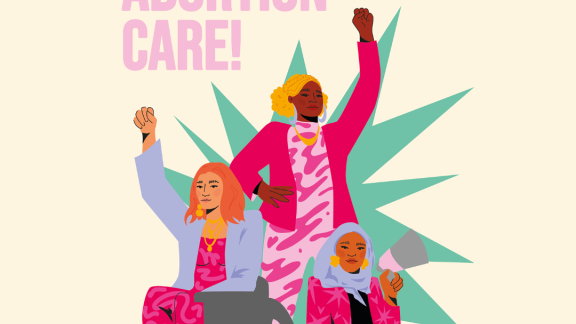The European Safe Abortion Networking Group is a group of national, regional
and international SRHR organisations based in Europe, working for universal access
to safe, legal abortion. The group was formed in 2019 and has been meeting online
bi-monthly since the Covid pandemic began.
Many people assume everything is OK with abortion in Europe. And it’s true that most of the countries in the region have very good laws and services compared to the rest of the world and that much has improved over the last years with strong national advocacy campaigns, feminist-run clinics, and active support from a long list of political parties, human rights bodies and the World Health Organization.
But we still have a long way to go to make abortions universally accessible to everyone who seeks
them. In many of our countries, even those with good laws on paper, access in practice is far from
perfect, and making change happen is a slow process. We are going through a period where anti-rights movements are posing a serious threat to abortion access across the region.
Most European countries allow abortion on request in the first 12-14 weeks of pregnancy - although not without any regulatory, practical or medically unnecessary obstacles. Access to second and especially third trimester abortions, however, can be very limited and hemmed in with conditions, restrictions and requiring third party approval (doctors, parents), even though later abortions are so few and needed in the most desperate of situations.
In a number of countries, abortion is still in the penal code, which permits legal systems to prosecute individuals for having or providing abortions, and also adds to stigma and discrimination.
Moreover, there are still countries where most or all abortions are illegal, including Malta, Andorra and Poland, and where women are compelled to seek abortions outside the law - especially the growing numbers using pills but not under a clinician’s control. Women having abortions, and advocates for abortion rights are being prosecuted too, in Poland, Andorra, Malta and England.
Almost invisibly, across the whole panorama of legal and clinical restrictions, thousands of women are still having to travel within and between countries to get abortions, often supported by under-resourced grassroots organisations and collectives instead of being supported by the State.
The pandemic years made many things more difficult. Medical abortion pills were scarce in some
countries and still are - and some countries still do not even allow abortion pills at all (e.g. Slovakia, Hungary). Travel across borders for abortions, especially later abortions, obviously became more difficult. On the other hand, some countries have approved the use of telemedicine and self-managed abortion with pills up to some point in the first trimester and it has now become a permanent option in some countries (such as France and the UK) and is well-established as an option within the care pathway in Ireland.
Here are some of the most important legal and service-related changes and improvements
we are calling for and will campaign for in our countries and across the region going forward:
- Complete decriminalisation of abortion in all countries, both as a harm reduction strategy to reduce maternal mortality and morbidity but also to ensure the full enjoyment of human rights, bodily autonomy and voluntary motherhood.
- Universal access to safe, legal abortions, as early as possible and for as long as needed, with choice of method.
- Self-managed abortion with pills up to 12 weeks should be allowed in all countries as recommended by the World Health Organization. Statement and Call for Action by the European Safe Abortion Networking Group for International Safe Abortion Day, 28 September 2023
- Approval of combined medical abortion pills, and approval of misoprostol as an abortifacient, in all countries. Medical abortion pills are a very safe method, not only in the first trimester but also for later abortion, and are on the WHO Essential Medicines List.
- All countries should implement the 2022 World Health Organization Abortion Care guidelines including training for the range of health care providers, including pharmacists, who can provide services.
- Increase access to abortion beyond 12 weeks through training and education for midwives, nurses and doctors.
- Policies must be gender inclusive, that is, applying to women, girls and all people who can become pregnant and who seek an abortion.
when
Subject
Abortion Care











